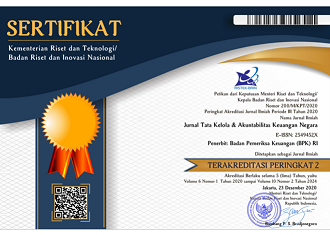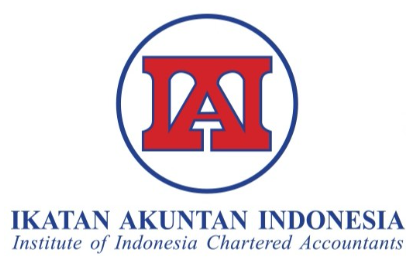THE ROLES OF POLITICAL POWER IN BUDGET PROCESS: HOW TO ACCOMODATE THEM? A CASE STUDY
DOI:
https://doi.org/10.28986/jtaken.v6i1.412Keywords:
Political power, DPRD, regional head, budget, accountabilityAbstract
This research has two main objectives. The first objective is to identify the role of political power in the budgeting process, while the second is to propose a control mechanism to enable a budgeting process to accommodate political power in terms of accountability. Indonesia’s Corruption Eradication Commission reports on the misuse of political power to manipulate budgeting in an organized manner. Execution of the budgeting process that does not follow the prevailing strategic policy constitutes fraud. The functions of budgeting are allocation, distribution, and stabilization. This study analyzes budgeting that intertwines with the wielding of political power. The study employed qualitative research supplemented by a case study to explain why and how such phenomena are occurring. The analysis was conducted using the thematic method by way of open-ended questionnaires to explain the data and information that were accumulated concerning the topic at hand and their relevance. Results show that political power plays both negative and positive roles. The positive aspect of the exercise of political power is that it is used as a public channel between society and the government, while its negative impact is the various risks that it poses, such as political power being used to advance self-interests. Political power does not share the same degree of impartiality as statutory rules. The form of politics can alter a budgeting activity or program. The application of a certain budgeting system is proposed to reduce errors and record activity history. Concerning the evaluation of APBD by the DPRD, APIP must help enforce control by reviewing budget changes against the relevant goals and objectives.
References
Astuti, T. P., & Yulianto. (2016). Good governance pengelolaan keuangan desa menyongsong berlakunya Undang-Undang Nomor 6 Tahun 2014. Berkala Akuntansi dan Keuangan Indonesia, 1(1), 1-14. doi: 10.20473/baki.v1i1.1694
Bassoli, M. (2011). Participatory budgeting in Italy : An analysis of (almost democratic) participatory governance arrangements. International Journal of Urban and Regional Research, 36(6), 1183-1203. doi: 10.1111/j.1468-2427.2011.01023.x
Benjamin, G., & Schugurensky, D. (2019). Participatory Budgeting, Civic Education, and Political Capital. In Encyclopedia of Educational Innovation (pp.1-6). doi: 10.1007/978-981-13-2262-4_37-1
Boven, M. (2005). Public accountability. In E. Ferlie, L. Lynne, dan C. Pollitt, (eds.), The Oxford Handbook of Public Management. doi: 10.1093/oxfordhb/9780199226443.003.0009
BPK RI. (2019). Ikhtisar Hasil Pemeriksaan Semester (IHPS) II Tahun 2018 (Summary of Semester Audit Results II Year 2018). Retrieved from https://www.bpk.go.id/ihps
BPS. (2019). Statistik perekonomian Indonesia Tahun 2018. Retrieved from https://www.bps.go.id/publication
Brandsma, G., & Schillemans, T. (2013). The accountability cube: Measuring accountability. Journal of Public Administration Research and Theory, 23(4), 953-975. doi: 10.1093/jopart/mus034.
Braun, V., & Clarke, V. (2006). Using thematic analysis in psychology. Qualitative Research in Psychology, 3(2), 77-101. doi: 10.1191/1478088706qp063oa
Creswell, J. W. (2014). Research design pendekatan kualitatif, kuantitatif, dan mixed (terjemahan). Yogyakarta: Pustaka Pelajar.
Gabrillin, A. (2018). Komisi Pemberantasan Korupsi (KPK) menangkap 38 kepala daerah dan 86 anggota DPRD. Kompas. Retrieved June 14, 2019 from https://nasional.kompas.com/read/2018/11/18/13412061/kpk-38-kepala-daerah-dan-86-anggota-dprd-di-sumatera-tersangkut-kasus
Government Regulation Number 58 of 2005 concerning Regional Financial Management as amended by Government Regulation Number 12 of 2019 (Peraturan Pemerintah Republik Indonesia Nomor 58 Tahun 2005 tentang Pengelolaan Keuangan Daerah yang diubah dengan Peraturan Pemerintah Nomor 12 Tahun 2019). Retrieved from. Retrieved from https://peraturan.bpk.go.id/Home/Details/103888/pp-no-12-tahun-2019
Government Regulation Number 8 of 2008 concerning Stages of Procedure for Preparation of Control and Evaluation of the Implementation of Local Development Plans (Peraturan Pemerintah Republik Indonesia Nomor 8 Tahun 2008 tentang Tahapan Tata Cara Penyusunan Pengendalian dan Evaluasi Pelaksanaan Rencana Pembangunan Daerah). Retrieved from https://peraturan.bpk.go.id/Home/Details/4820
Hansen, D., Mowen, M., & Guan, L. (2009). Cost management: Accounting and control. Cincinnati: South-Western College
Koeswara, H., Liesmana, R., Hanida, R. P., & Muluk, S. (2013). Proposing an efficient and democratic policy of general election budget for promoting local fiscal autonomy. Bisnis & Birokrasi Journal, 20(2), 65-77. doi: 10.20476/jbb.v20i2.3066.
KPK. (2020a). Statistik Penindakan Tindak Pidana Korupsi Berdasarkan Profesi dan Jabatan. Retrieved March 27, 2020, from https://www.kpk.go.id/id/statistik/penindakan/tpk-berdasarkan-profesi-jabatan.
KPK. (2020b). TPK Berdasarkan Wilayah. Retrieved March 17, 2020, from https://www.kpk.go.id/id/statistik/penindakan/tpk-berdasarkan-wilayah
Krenjova, J., & Raudla, R. (2013). Participatory budgeting at the local level: Challenges and opportunities for new democracies. Halduskultuur-Administrative Culture, 14(1), 18-46.
Mardiasmo. (2009) Akuntabilitas sektor publik. Yogyakarta: Andi
Mo, P. H. (2008). Government expenditures and economic Growth: The supply and demand sides. Fiscal Studies,: The Journal of Applied Public Economics, 28(4), 497-522. doi: 10.1111/j.1475-5890.2007.00065.x
Musgrave, R., & Peacock, A. (1958). Classics in the theory of public finance. Retrieved from https://www.google.com/books?hl=id&lr=&id=XhCwCwAAQBAJ&oi=fnd&pg=PR8&dq=richard+musgrave+public+finance&ots=U9PeHSmAxy&sig=Uv3qtvXZ2xtVx7-8H44CEyHA5g
Nordiawan, D., & Hertianti, A. (2010). Akuntansi sektor publik. Edisi Kedua. Jakarta: Salemba Empat.
Palanjian, L. (2008). Party control and budget estimates: A study of politics in the federal budget process. Berkeley Undergraduate Journal, 20(2), 1-21. Retrieved from https://escholarship.org/uc/item/7515h7n6
Patty, J. R. (2019). Budget forecast errors and budget deviation: Financial capability index as a moderating variable. Jurnal Tata Kelola dan Akuntabilitas Keuangan Negara, 5(2), 157-175. doi: 10.28986/jtaken.v5i2.353
Pratiwi, R. N. (2012). Politisasi anggaran sektor publik. Interaktif: Jurnal Ilmu-ilmu Sosial, 1(2).
Schulze, G. G., & Sjahrir, B. S. (2014). Decentralization, governance, and public service delivery. In H. Hill (Ed.), Regional dynamics in a decentralized Indonesia (pp. 186-207). ISEAS–Yusof Ishak Institute.
Shah, A. (2007). Participatory budgeting. Washington, DC: World Bank. Retrieved from https://openknowledge.worldbank.org/handle/10986/6640
Shopiana., & Panjaitan, I. (2017) The effect of characteristics of budgetary purposes and the application of accounting information system on performance of local government officials with decentralization as moderating variable. Jurnal Tata Kelola dan Akuntabilitas Keuangan Negara, 5(2), 157–175. doi: 10.28986/jtaken.v3i1.69
Spada, P. (2009, June). The economic and political effects of participatory budgeting. Paper presented at the 2009 Congress of the Latin American Studies Association. Retrieved from https://www.researchgate.net/publication/241756926_The_Economic_and_Political_Effects_of_Participatory_Budgeting
Stake, R. E. (1995). The art of case study research. London: Sage Publications, Inc.
Svaljek, S., Bakaric, I. R., & Sumpor, M. (2019). Citizens and the city: the case for participatory budgeting in the City of Zagreb. Public Sector Economics, 43(1), 21-48. doi: 10.3326/pse.43.1.4
Tsurkan, M. V., Sotskova, S. I., Aksinina, O. S., Lyubarskaya, M. A., & Tkacheva, O. N. (2016). Influence of the participatory budgeting on the infrastructural development of the territories in the Russian Federation. International Journal of environmental and science education, 11(15), 7684-7702.
UNESCAP. (2020). What is good governance? Retrieved from https://www.unescap.org/resources/what-good-governance
Vance, A., Lowry, P. B., & Eggett, D. (2015). Increasing accountability through user-interface design artifact: A new approach to addressing the problem of access-policy violations. MIS Quarterly, 39(2), 1–18. doi: 10.25300/MISQ/2015/39.2.04
Downloads
Submitted
Accepted
Published
How to Cite
Issue
Section
License

Jurnal Tata Kelola dan Akuntabilitas Keuangan Negara is licensed under
a Creative Commons Attribution-ShareAlike 4.0 International License




















